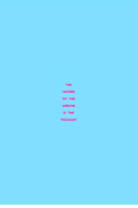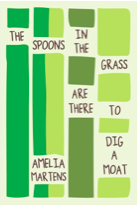
The Father of the Arrow Is the Thought by Christopher DeWeese
Octopus Books
$14.95, 75 pages
published August 2015

The Spoons in the Grass Are There to Dig a Moat by Amelia Martens
Sarabande Books
$14.95, 64 pages
published April 2016
Paul Klee, one of the most gifted and prolific visual artists of the early twentieth century, defies easy categorization. A noted colorist, his vast oeuvre reflects several prolific periods, having been variously associated with the major movements of his time, including Expressionism, Cubism, and Surrealism. Christopher DeWeese’s The Father of the Arrow Is the Thought takes its title from a Klee passage, and like the dynamic painter, DeWeese contorts reality in order to extract meaning from reality. Resistant to mere pronouncements of beauty and morality, The Father of the Arrow Is the Thought is a dense, hallucinatory collection of postmodern pastorals that asks what nature means in our ambivalent, consumerist age marked by ecological ruin and the loss of myth’s enchantments.
DeWeese’s second book relentlessly explores, and at times objectifies, landscape as an imaginative construct. “What’s been thrown/to the dumbstruck waters/will not come back/unless I imagine it,” DeWeese writes in “The Tide,” the collection’s final and most ambitious poem. Unlike the Romantics, DeWeese remains suspicious of cataloging lush descriptions of the natural world until they build into an emotional epiphany. While it would be convenient to position his work in the context of the recent ecopoetical movement, DeWeese chooses cognition over ache and transference over reverence. Instead, his best poems, such as “The Bluff,” “The Yard,” “The Lake,” and “The Cavern,” use place as a starting point for associative interrogations of our cultural moment, be it our constant state of war, our dependence on technology, or our naïve idealization of romantic love. The wry closing lines of “The Narrows,” a latter poem, articulate the book’s chief impulse:
I’ve been weeping
in the nature poem
buried just under this one,
a melancholy lyric
whose bears mistake me
for the kind of curse
worth nuzzling.
The images keep deepening
and I go down with them,
pawing the endless dirt
until I can’t see anything
but the words I’ve been
yelling this song.
Like Richard Brautigan, DeWeese counts metaphor and wit among his many talents, as his poems are full of unexpected twists and jarring associations. In “The Forest,” one of the book’s most arresting poems, our search for logic and order among tree branches is like smuggling children “through the wild nights/we have believed in,” and later, “the branches turned into x-rays/of some ocean thing,/a freakish vertebrae/or tangle of hooks/sunk and languid/against the silt of heavy autumn.” Additionally, consider these lines from “The Pond”:
To believe in a stone,
first you must believe
you can throw it in.
You must believe
in the goldfish
it will become.
As if to untuck
the camouflaged pasture
where we sleep,
the night’s fine claws
ride down on us.
Imagination dominates this passage. Rhetorically, it insists that only human belief and human will exerted upon a stone makes a stone real. Once thrown, the stone morphs into a fish, and when the claws of night finally swoop upon it, how remarkable that they “ride down on us,” as if finally we participate in this transfiguration ourselves. In the span of these eleven lines, the poet argues that nearly every aspect of the observable pond, from its animal narratives to its submerged bones, unspools from the mind. It comes as no surprise, then, that the poem finally ends with an image of distant astronauts and their “strange and weightless dreams.” Here and elsewhere, DeWeese’s poems make use of simple diction, but remain tonally complex and at times downright slippery. Like John Ashbery, Marianne Moore, and Dean Young, he can veer from sincerity to irony in the span of a few mere lines. One wonders even after finishing the collection if his various allusions to Keats, Eliot, and James Wright are intended as tributes, mockeries, or both.
Purposefully monotonous, the poems in The Father of the Arrow Is the Thought blur together by the end. Each poem is titled “The ______,” with the blank representing a part of nature’s immense dominion, be it pasture, plains, or hill. There isn’t a single stanza break in the book, and DeWeese’s short free-verse lines are remarkably even in length, with most containing four or five words. Though the collection is broken into four sections, the sequencing appears intuitive rather than methodical. The cumulative effect of these strategies is that each poem feels enriched by its participation in the book-length project, but foggily indistinct when weighed individually. By taking this risk, however, DeWeese reminds us that even our classification of nature into various terrains and ecosystems is a superimposition. Readers are left wondering how we can participate in, and marvel at, the continuous grandeur of the natural world without reducing it to a mere curio or commodity, and DeWeese deserves credit for reinvigorating this ancient dilemma.
Equally engrossing is Amelia Martens’ richly imaginative first book, which will likely be one of this year’s best debuts. Comprised entirely of prose-poems, Martens confronts the anxiety and fear of our zeitgeist—rife with mindless consumerism, international terrorism, and spiritual malaise—in vignettes that reflect a nightmarish American psyche. These grim assessments, juxtaposed with domestic studies that celebrate the whimsy and innocence of young daughters, render The Spoons in the Grass Are There to Dig a Moat a dizzying little book that yearns for escapism even as it insists on documenting our self-destruction.
Associative and syntactically lush, Martens’ sentences endure as the chief propulsive force behind each verse paragraph and the collection as a whole. Consider these potent opening lines, chosen at random:
“Floating on his back in a cow pond, the Prince of Peace practices his out-of-body experience.” (“Routine”)
“Two Lincolns duel sunlight on the sidewalk.” (“Historical Accuracy”)
“Tonight is gut-shot with fireflies.” (“Shoreline”)
Martens creates immediacy, intrigue, and traction by beginning her best poems with peculiar narrative situations, striking metaphorical transformations, or nakedly bold pronouncements. Few stretch beyond the middle of the page and most contain a dozen or fewer sentences. Despite their brevity, however, Martens’ view of the world remains keenly panoramic, as we see in “They Shoot People, Don’t They?,” which derives much of its lyric power from rhyme and fragment. The poem follows in its entirety:
Much of the world is current on their hunger strike. I can’t tell our daughters everything will be all right. They are less afraid of the dark than of the light. Our keelboat has run aground. Yesterday, another man opened a door in someone’s chest. You think we are coming around. You think we are blessed. Homeward bound. What is there to confess? The parts per million. The hummingbird needles. The losses so fine we shed them with our skin.
Startlingly, Jesus of Nazareth recurs throughout the collection as a mercurial figure oscillating between messiah and menial laborer who increasingly seems like the personification of an insouciant fundamentalist. In “Dust,” we find him in a bar lazily reading the newspaper, bored with “the prayers of a billion people” and the smoke that “rises from the ammunition plant.” In “The Prince of Peace Is Herding Sheep,” he is a psychopathic shepherd stalking his own flock, as “one by one, he touches their heads and they drop dead.” In “Marathon,” one of the book’s most resonant poems (reprinted here in the April issue of Plume), Martens depicts Jesus watching the televised carnage unfold from the 2013 Boston Marathon bombing. In each instance, Jesus remains divine, but is coolly removed from the machinations of human suffering. Much like his plastic figurines and framed portraits, Jesus endures, omnipresent and beseeched, but in Martens’ vision of reality, he is more akin to a Greek god whose aloof fickleness prevents him from intervening in the daily tribulations he watches with detachment and, at times, delight.
Life studies of domesticity and young children salvage Martens’ otherwise somber prognosis, buoying the book’s darker themes. “A Field,” with its bedtime story anaphora that begins each sentence with “Once…,” captures the bewildered awe of a child’s early awakening to nature’s grandeur. Similarly, “Morning Girl” catalogs a mother’s dutiful caretaking and reminds us at the end that there are “some things that can’t be burned.” Simultaneously playful and dramatic, “Pluto Was a Planet” details a daughter’s growing awareness of life and the grandeur of the universe. If humans are the worst sickness on Earth, Martens seems to suggest, the love, imagination, and purity of children might very well be the best medicine on our path to recovery. Or, as she boldly pronounces near the end of “And Then the Idea of Weeds,” we must give ourselves “back into mythology, but not oblivion.”
Martens’ sorcery only falters sporadically. “Dear Brian Turner” is, on the surface, a quaint epistolary poem, but lacks the intensity found elsewhere in the book. “B-I-N-G-O” plays on the Goldilocks fable, getting lost in its own surrealism, while a similar poem, “The Secret Lives of Cows” riffs on the loneliness of bovines without ever capitalizing on their mass exploitation in our nation’s food consumption. “Newtown” is a mournful and serious enough tribute to the schoolchildren lost in that heartbreaking massacre, but conveniently stops short of interrogating the psychological and cultural forces that permitted it to transpire.
Despite their many differences, Christopher DeWeese and Amelia Martens demonstrate wondrous imagination, political astuteness, and refreshingly original voices. Both poets celebrate the enormity of the natural world and question our human decadence within it. Unified by a dogged hope in art’s ability to purify, The Father of the Arrow Is the Thought and The Spoons in the Grass Are There to Dig a Moat reconcile conscience with artistic vision, which is a noble feat indeed.
Adam Tavel won the Permafrost Book Prize for Plash & Levitation (University of Alaska Press, 2015). He is also the author of The Fawn Abyss (Salmon Poetry, forthcoming) and the chapbook Red Flag Up (Kattywompus, 2013). Tavel won the 2010 Robert Frost Award and his recent poems appear or will soon appear in Beloit Poetry Journal, The Gettysburg Review, Sycamore Review, Passages North, The Journal, Valparaiso Poetry Review, and American Literary Review, among others. He can be found online at http://adamtavel.com/.

